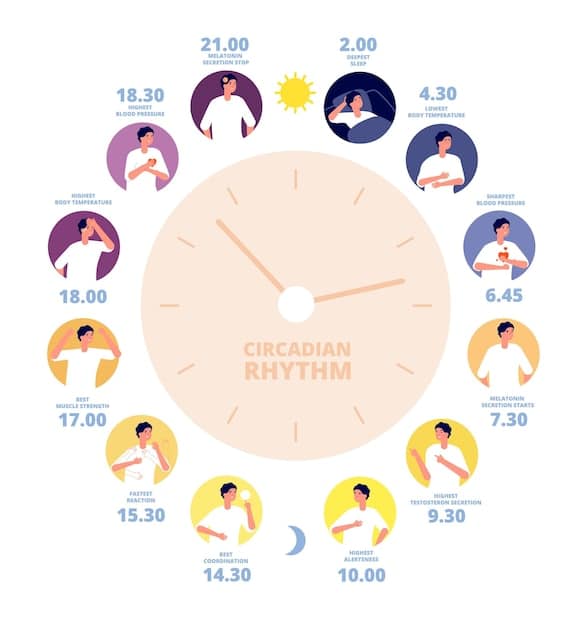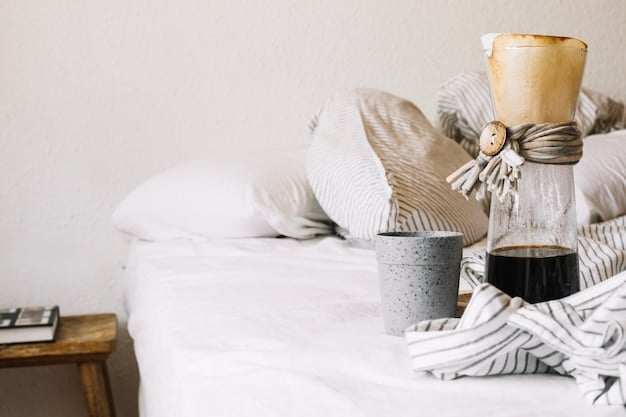Boost Productivity: Optimize Your Sleep Schedule for Peak Performance

The Impact of Sleep on Productivity: Optimizing Your Sleep Schedule for Peak Performance involves aligning your sleep schedule with your body’s natural rhythms to enhance focus, energy, and overall work efficiency in a home office setting, leading to improved performance and well-being.
Feeling sluggish and unproductive while working from home? The key to unlocking your peak performance might be simpler than you think: the impact of sleep on productivity: optimizing your sleep schedule for peak performance is crucial. Discover practical strategies to transform your workdays by prioritizing sleep.
Understanding the Circadian Rhythm and Its Role in Productivity
Our bodies operate on an internal clock known as the circadian rhythm, which regulates sleep-wake cycles and various physiological processes. Understanding this rhythm is fundamental to grasping the impact of sleep on productivity: optimizing your sleep schedule for peak performance. When aligned, we experience heightened alertness and cognitive function.
Disruptions to this rhythm, caused by irregular sleep patterns or exposure to artificial light, can lead to decreased performance and impaired decision-making. A consistent sleep schedule reinforces the circadian rhythm, leading to more predictable and restful sleep.
The Science Behind Sleep-Wake Cycles
The circadian rhythm is influenced by external cues like sunlight and darkness. These cues synchronize our internal clock with the environment, regulating hormone release, including melatonin (sleep hormone) and cortisol (stress hormone). Proper regulation of these hormones is essential for optimal function during waking hours.
Practical Tips for Aligning with Your Circadian Rhythm
To leverage your circadian rhythm for increased productivity, consider these tips:
- Maintain a Consistent Sleep Schedule: Go to bed and wake up at the same time every day, even on weekends.
- Expose Yourself to Natural Light: Spend time outdoors during daylight hours, particularly in the morning.
- Limit Screen Time Before Bed: The blue light emitted from electronic devices can interfere with melatonin production.
- Create a Relaxing Bedtime Routine: Establish a calming pre-sleep routine to signal your body that it’s time to rest.

By synchronizing your sleep schedule with your circadian rhythm, you can optimize your body’s natural processes, leading to enhanced focus, energy, and overall productivity. This alignment isn’t just about getting enough sleep; it’s about getting sleep at the right time.
The Direct Link Between Sleep Deprivation and Decreased Work Performance
Sleep deprivation has a profound impact on cognitive function and overall work performance. Failing to prioritize the impact of sleep on productivity: optimizing your sleep schedule for peak performance leads to diminished concentration, impaired memory, and reduced problem-solving abilities. These effects can significantly hinder job performance and overall achievement.
Chronic sleep loss accumulates a “sleep debt,” which can manifest as persistent fatigue and decreased motivation. Address this sleep debt by implementing strategies that prioritize restful sleep.
Here are some ways sleep deprivation affects work performance:
- Reduced Attention Span: Sleep-deprived individuals struggle to maintain focus, leading to increased errors and decreased productivity.
- Impaired Decision-Making: Lack of sleep affects the brain’s ability to process information, leading to poor judgment calls and flawed decisions.
- Decreased Creativity: Sleep is critical for creative thinking and problem-solving. Without adequate rest, innovative ideas become harder to generate.
- Increased Stress and Irritability: Sleep deprivation can exacerbate stress levels and lead to mood swings, affecting interpersonal relationships at work.
The Cognitive Impact of Sleep Loss
Research consistently demonstrates that sleep deprivation negatively impacts various cognitive domains, including attention, memory, and executive function. These cognitive deficits translate to lowered work efficiency and overall job impairment.
Strategies for Combating Sleep Deprivation
- Prioritize Sleep: Make sleep a non-negotiable part of your daily routine. Aim for 7-9 hours of quality sleep per night.
- Create a Sleep-Conducive Environment: Ensure your bedroom is dark, quiet, and cool for optimal sleep conditions.
- Limit Caffeine and Alcohol: Avoid these substances, especially close to bedtime, as they can disrupt sleep patterns.
By understanding the detrimental effects of sleep deprivation on cognitive function and work performance, you can make informed choices to prioritize sleep and maximize your productivity. The importance of restful sleep should not be underestimated.
Optimizing Your Sleep Environment for a Better Night’s Rest
The environment in which sleep takes place plays a critical role in determining the quality of rest. Optimizing the sleep environment is critical to mastering the impact of sleep on productivity: optimizing your sleep schedule for peak performance. A well-designed sleep space promotes relaxation and facilitates an undisturbed night’s sleep.
Many factors contribute to an optimal sleep environment, including temperature, noise levels, and light exposure. Addressing these factors can significantly improve sleep quality.
The Role of Temperature in Sleep Quality
Maintaining a cool room temperature is essential for promoting restful sleep. A slightly cooler environment signals the body to release melatonin, preparing you for sleep. The ideal temperature range for sleep is typically between 60-67 degrees Fahrenheit (15-19 degrees Celsius).
Adjusting your thermostat or using fans and air conditioners can help regulate the temperature in your bedroom. Conversely, avoid overheating your room, as it can disrupt sleep patterns.
Minimizing Noise and Light Pollution
Noise and light pollution can significantly interfere with sleep quality. Minimize external noises by using earplugs, white noise machines, or soundproofing measures. Darkness is equally essential; use blackout curtains or sleep masks to block out light.

Creating a serene and distraction-free sleep environment is crucial for promoting relaxation and optimizing sleep quality. A well-considered sleep space can become a sanctuary that encourages restful and restorative sleep, which will impact the impact of sleep on productivity: optimizing your sleep schedule for peak performance.
The Power of a Consistent Bedtime Routine
A consistent bedtime routine is a powerful tool for signaling your body and mind that it’s time to unwind and prepare for sleep. Implementing an effective bedtime routine is key to unlocking the impact of sleep on productivity: optimizing your sleep schedule for peak performance. A well-structured routine can ease the transition from wakefulness to sleep, leading to better sleep quality.
The bedtime routine should consist of a series of calming and relaxing activities performed in the same order each night. The consistency of the routine helps to regulate the circadian rhythm.
Elements of an Effective Bedtime Routine
Here are examples of activities that can be included in a bedtime routine:
- Dimming the Lights: Reducing light exposure helps stimulate the release of melatonin.
- Reading a Book: Choose a relaxing book rather than engaging with screens.
- Taking a Warm Bath or Shower: The change in body temperature can promote relaxation.
- Practicing Relaxation Techniques: Incorporate meditation, deep breathing, or gentle stretching.
How Consistency Reinforces the Sleep-Wake Cycle
Performing your bedtime routine at the same time each evening helps to reinforce your body’s natural sleep-wake cycle. This consistency signals to your brain that it’s time to rest and prepare for sleep, making it easier to fall asleep promptly.
The Importance of Avoiding Screens Before Bed
The blue light emitted from electronic devices can interfere with melatonin production, disrupting your sleep cycle. It is beneficial to shut off all electronic devices and avoid watching television at least one hour before bedtime. Use this time instead for relaxing activities, such as meditation.
A consistent bedtime routine offers a pathway to more restful and better-quality sleep. By making it part of your daily schedule, you prioritize your well-being and prepare your body and mind for a restful night.
Nutrition and Hydration: Fueling Your Sleep for Peak Performance
Nutrition and hydration significantly impact the quality of sleep. Proper nutrition and hydration are vital parts in understanding the impact of sleep on productivity: optimizing your sleep schedule for peak performance. What we eat and drink throughout the day and especially before bed can influence our sleep patterns.
Diet choices play a crucial role in the production of hormones like melatonin and serotonin, which regulate sleep. Proper hydration ensures that cognitive functions operate efficiently, supporting optimal sleep.
Foods That Promote Sleep
- Tart Cherries: Natural source of melatonin, helping regulate sleep.
- Almonds: Provide magnesium, which promotes relaxation.
- Chamomile Tea: Known for its calming properties.
- Kiwi: Rich in antioxidants and several vitamins and minerals that promote sleep.
Prioritizing proper nutrition and hydration will fuel better sleep, which then increases your productivity. You will see a transformation in overall work abilities.
Hydration’s Impact on Sleep Quality
Dehydration can lead to disrupted sleep as well as fatigue. Ensuring you are properly hydrated throughout the day will prevent these sleep interruptions. Staying properly hydrated keeps all systems functioning properly.
Staying properly hydrated supports many things, including regulating body temperature, transporting nutrients, and removing waste. Hydration helps regulate the sleep/wake cycle.
Timing Your Meals for Optimal Sleep
Avoid large, heavy meals close to bedtime. Eating a heavy meal can disrupt sleep. Instead, opt for smaller, lighter meals or snacks a few hours before. These will ensure that your body does not exert too much energy digesting while you are trying to sleep.
Limiting consumption of caffeine or alcohol before bed is important. These can disrupt your sleep cycle.
The Significance of a Balanced Diet
A balanced dietary intake is essential for overall health and wellness, as it directly affects your sleep. Eat a variety of vitamins and minerals that your body is deficient in.
Prioritizing nutrition and hydration are helpful, but the importance of balancing this will also bring great value to your sleep. This will help your productivity as well.
Assessing and Monitoring Your Sleep Quality Over Time
Assessing and monitoring sleep quality can provide valuable insights into sleep patterns. This important factor is crucial to understanding the impact of sleep on productivity: optimizing your sleep schedule for peak performance. Knowing how to assess is a key step to optimizing your entire schedule.
Using sleep tracking devices or apps can provide data on sleep duration, sleep stages, and nighttime awakenings. Regularly reviewing this data can help identify sleep-related issues.
The Role of Sleep Tracking Technology
Sleep tracking devices, such as fitness trackers and smartwatches, monitor sleep patterns by measuring movement, heart rate, and other physiological parameters. The data collected can be analyzed to provide insights into hours of sleep. These trackers provide insights to assess needs and adjustments.
Interpreting Sleep Data
Different stages of sleep such as NREM and REM are vital for many different things, including memory consolidation and physical restoration. Knowing these stages is important to know for data tracking.
- Sleep Latency: How long it takes you to fall asleep each night.
- Sleep Duration: The total amount of time spent sleeping.
- Sleep Efficiency: The ratio of time spent asleep versus time spent in bed.
Consulting with Healthcare Professionals
If persistent sleep issues are identified, it’s recommended to consult with a qualified professional. Regular check-ins with professionals are a key to long term success. Consulting with a healthcare professional can help diagnose sleep disorders and create a personalized treatment plan.
Taking proactive measures to assess and monitor your sleep quality will greatly impact the quality of your work.
| Key Point | Brief Description |
|---|---|
| 😴 Consistent Sleep Schedule | Helps regulate your circadian rhythm for better sleep. |
| ☀️ Natural Light Exposure | Regulates hormones and boosts daytime alertness. |
| 🛏️ Optimized Sleep Environment | Dark, quiet, and cool room for optimal rest. |
| 🍵 Calming Bedtime Routine | Prepares your body and mind for sleep. |
Frequently Asked Questions
▼
Most adults need between 7-9 hours of sleep per night to function at their best. However, individual sleep needs can vary based on age, genetics, and lifestyle factors.
▼
Signs of sleep deprivation include excessive daytime sleepiness, difficulty concentrating, impaired memory, irritability, and weakened immune function. Chronic sleep loss can have severe effects.
▼
Yes, strategic napping can boost productivity. A short 20-30 minute nap can improve alertness, cognitive performance, and mood. Avoid longer naps, which can lead to grogginess.
▼
Improving sleep hygiene involves creating a sleep-conducive environment, maintaining a consistent sleep schedule, limiting screen time before bed, and avoiding caffeine and alcohol close to bedtime.
▼
If you experience persistent sleep difficulties, such as insomnia, excessive snoring, or daytime sleepiness, it’s recommended to consult with a healthcare professional. They can assess and provide treatment.
Conclusion
In conclusion, prioritizing sleep is not just about feeling rested; it’s about unlocking your full potential and achieving peak performance in all areas of your life. By understanding the profound impact of sleep on productivity: optimizing your sleep schedule for peak performance and implementing strategies we have discussed, you can transform your work habits, improve cognitive function, and maximize your success.





